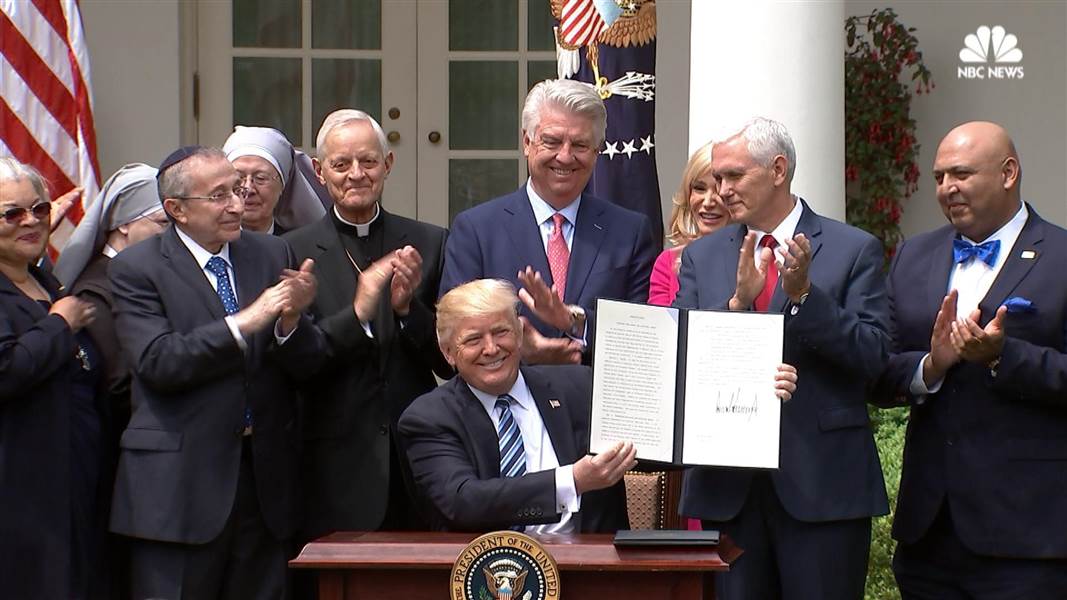
The Freedom From Religion Foundation is welcoming a new report highlighting deficiencies in the IRS’ enforcement of a rule that prohibits churches and other 501(c)(3) nonprofits from engaging in electioneering.
The U.S. Department of the Treasury Inspector General for Tax Administration — which is an independent arm of the federal government that oversees the IRS and acts as an IRS watchdog — recently published a report criticizing the IRS for failing to enforce the politicking ban, known as the Johnson Amendment, and for employing subjective standards to determine what constitutes political activity.
“This report confirms what FFRF has been warning about for years,” comments FFRF Co-President Annie Laurie Gaylor. “While most (c)(3) nonprofits follow the law, many churches openly flout the law and are not held accountable.”
The report is particularly timely because President Trump and Vice President Pence continue to repeat their lie about “destroying the Johnson Amendment,” a provision FFRF has long worked to uphold.
In May 2017, FFRF sued Trump over his executive order on religious freedom, an order that he claimed “stops the IRS from revoking a church’s or nonprofit’s tax-exempt status if it chooses to support a political cause.” Trump signed the executive order with great fanfare during a National Day of Prayer ceremony in the Rose Garden before a largely clerical audience. He said: “This executive order directs the IRS not to unfairly target churches and religious organizations for political speech.”
Trump also told churches that, with his new order, they would not lose their tax exemption for violating the rule and could say whatever they wanted: “This financial threat against the faith community is over. . . . You’re now in a position where you can say what you want to say.”
FFRF won that lawsuit. Trump’s own Department of Justice explained to the court that the executive order did not do what Trump claimed and, in other words, that Trump was all talk.
The Washington Post, in an article cheekily titled, “Critics said Trump’s ‘religious liberty’ order does nothing. The administration’s lawyers seem to agree,” explains: “Department of Justice attorneys defending the order argued in court that it doesn’t change any existing laws or alter any policies to benefit churches or clergy.”
That lawsuit was not FFRF’s first to seek enforcement of the Johnson Amendment. The state-church watchdog sued in 2012 because the IRS had failed to fill the position that enforces the politicking rule against churches. That case was settled in FFRF’s favor in 2014, when the IRS demonstrated it had resumed investigations of political churches. FFRF renews its claims of nonenforcement in its newest lawsuit against the IRS filed today in D.C. District Court on a related matter of preferential treatment.
Despite FFRF’s lawsuits and Trump’s attorneys admitting that he lacked authority to overturn the Johnson Amendment by fiat, the recently published report reveals that the IRS has been ignoring a multitude of complaints alleging illegal tax-exempt politicking. The IRS’ own watchdog reviewed a sample out of more than 6,500 complaints between July 2015 and August 2016 and determined that “a significant number of allegations involving impermissible political activity were not forwarded to the [investigative body] as required.”
The report looks at 11 sample complaints that should have been submitted for further review because they alleged impermissible political activity. None of them were.
“Speed limits work to create safer roads even when there’s no police speed trap set up,” notes FFRF Co-President Dan Barker, “and it’s important to put pressure on the IRS to do its job and come down hard on these politicking churches.”
The reports recommends several sweeping changes to IRS practices so that churches and other tax-exempt organizations will be held accountable when they break the law. FFRF hopes to see these changes swiftly implemented.
FFRF is a national state-church watchdog with more than 32,000 members. Its purposes are protecting the constitutional separation between state and church, and educating the public about matters relating to nontheism.
Read more about the importance of the Johnson Amendment and its popularity with religious Americans (80 percent say it’s inappropriate for pastors to endorse a candidate in church) here.

